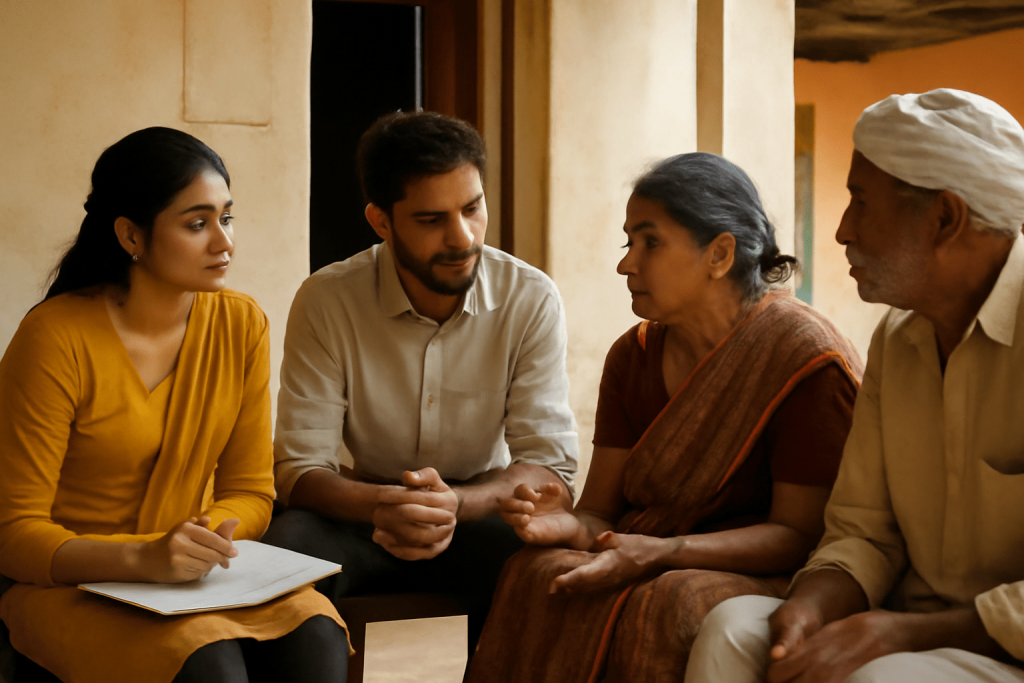The Indian social sector is experiencing a dynamic transformation, with traditional funding models evolving and innovative financing mechanisms taking root. In this landscape of change, collaboration, knowledge creation, and stakeholder engagement aren’t options any longer, they are the cornerstones of a thriving and impactful future.
Empowering Change Through Education: Cultivating Capacity for Impact
At the heart of this transformation lies capacity building. It’s about equipping both Implementing organisations and donors with the knowledge and skills to navigate the complexities of innovative finance, ultimately maximising their social impact. Creating knowledge through workshops becomes fertile ground for learning, fostering a deeper understanding of each stakeholder’s needs, expectations, and unique challenges.
These platforms are more than just spaces for information dissemination; they cultivate an environment of collaborative learning. Here, participants share experiences, learn from one another, and co-create solutions that address the realities of the Indian social sector. By bridging the gap between theory and practice, knowledge dissemination empower organisations to effectively leverage innovative financing tools, while donors gain valuable insights to make informed decisions aligned with their philanthropic goals.
Case Study: Social Impact Bonds – A Catalyst for Change
Social Impact Bonds (SIBs) serve as a shining example of innovative finance gaining traction in India. These outcomes-based contracts bring together diverse stakeholders – outcome funders, risk investors, and service providers – united by the common goal of achieving measurable social impact.
In Rajasthan, the world’s first Development Impact Bond (DIB) aimed to improve maternal and newborn health outcomes. The results were inspiring, with significant strides made in reducing maternal mortality rates and increasing access to quality healthcare services in rural areas. This successful pilot not only demonstrated the potential of SIBs in addressing critical social challenges but also paved the way for further exploration of this financing mechanism across diverse sectors in India.
Case Study: Water.org’s Impact in India
Water.org, a non-profit organisation co-founded by Gary White and Matt Damon, has been making significant strides in addressing the water crisis in India. Through innovative financing models such as WaterCredit, they have empowered communities to access safe water and sanitation solutions. By partnering with local microfinance institutions, Water.org has facilitated affordable loans for water and sanitation facilities, leading to improved health, education, and economic opportunities for millions of people across India.
Case Study: Teach For India’s Educational Impact
Teach For India (TFI) is a non-profit organisation that aims to eliminate educational inequity in India. By recruiting and training young professionals to teach in low-income schools, TFI works towards providing quality education to all children, regardless of their socio-economic background. Through collaborative efforts with schools, communities, and policymakers, TFI has made significant strides in improving educational outcomes and empowering students to reach their full potential.
International Case Study: The Impact Hub Network
The Impact Hub network is a global community of social entrepreneurs, innovators, and changemakers working towards sustainable solutions to pressing social and environmental challenges. With over 100 Impact Hubs worldwide, this network provides a platform for collaborative learning, knowledge sharing, and cross-sector partnerships. Through initiatives such as Impact Hub Academy and Impact Hub Scaling, the network supports social enterprises in scaling their impact and creating positive change in their communities.
Stakeholder Engagement: Building Bridges of Collaboration
Lasting impact requires collective action. Therefore, actively engaging with diverse stakeholders across the Indian social impact ecosystem is crucial. This includes grassroots NGOs, social enterprises, impact investors, philanthropists, policymakers, and academic institutions. By fostering dialogue and collaboration among these actors, fertile ground for innovation and collective problem-solving is created.
The India Impact Investing Council (IIIC) exemplifies this collaborative spirit. It brings together diverse stakeholders to promote knowledge sharing, build capacity within the impact investing space, advocate for enabling policies, and create a conducive environment for impact investing to flourish in India.
Collaborative Learning: A Holistic Approach
To truly empower changemakers, we need a holistic approach to collaborative learning that recognises the unique needs and perspectives of each stakeholder group within the Indian context. This involves:
- Tailored Programmes: Designing educational initiatives and workshops catering to the specific needs of different stakeholders, ensuring relevance and maximising learning outcomes. For example, programmes specifically designed for NGOs to understand and access innovative financing tools can be highly beneficial.
- Multi-stakeholder Dialogues: Creating platforms for open communication and knowledge exchange between diverse actors within the social impact ecosystem. Regular conferences and workshops that bring together investors, philanthropists, and social sector organisations to discuss challenges and opportunities in the Indian context can foster valuable collaborations.
- Building Bridges: Actively connecting Implementing organisation s with potential investors and donors, fostering partnerships that drive sustainable impact. Facilitating connections between social enterprises and impact investors helps bridge the funding gap and accelerate social progress.
Enhancing Impact Measurement in India
To effectively assess and communicate outcomes, improving impact measurement practices is vital for the Indian social sector. The introduction of robust impact measurement frameworks tailored to the unique contexts of various social interventions can provide valuable insights into the effectiveness and scalability of programmes. Initiatives such as the Impact Investors Council’s efforts to standardise impact measurement methodologies and metrics are contributing to this endeavour, facilitating better decision-making and resource allocation within the sector.
Contributing to the Ecosystem of Change
Institutions like the Indian School of Development Management (ISDM) with its Centre for Innovative Finance and Social Impact (CIFSI) play a vital role in contributing to this evolving ecosystem. Through research, education, and stakeholder engagement, they equip individuals and organisations with the knowledge and tools needed to navigate the complexities of innovative finance and drive meaningful change.
Building a Brighter Future Together
By investing in the growth of individuals and organisations, embracing collaboration, and actively engaging with diverse stakeholders, we can unlock the full potential of the social sector and create a more just and equitable world for all.




